Unit 1 Great Scientists完美课件
文档属性
| 名称 | Unit 1 Great Scientists完美课件 | 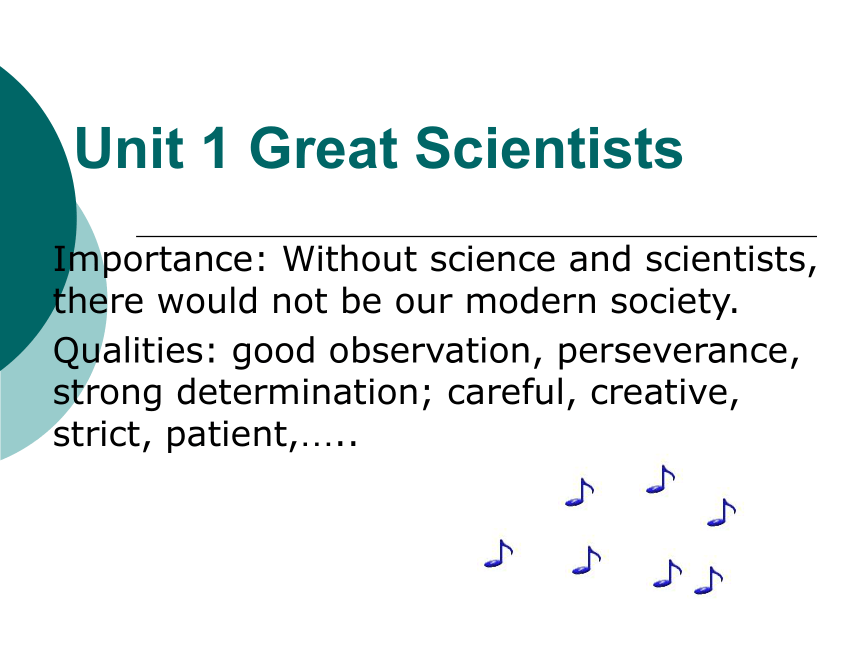 | |
| 格式 | zip | ||
| 文件大小 | 1.1MB | ||
| 资源类型 | 教案 | ||
| 版本资源 | 人教版(新课程标准) | ||
| 科目 | 英语 | ||
| 更新时间 | 2015-03-10 17:29:26 | ||
图片预览

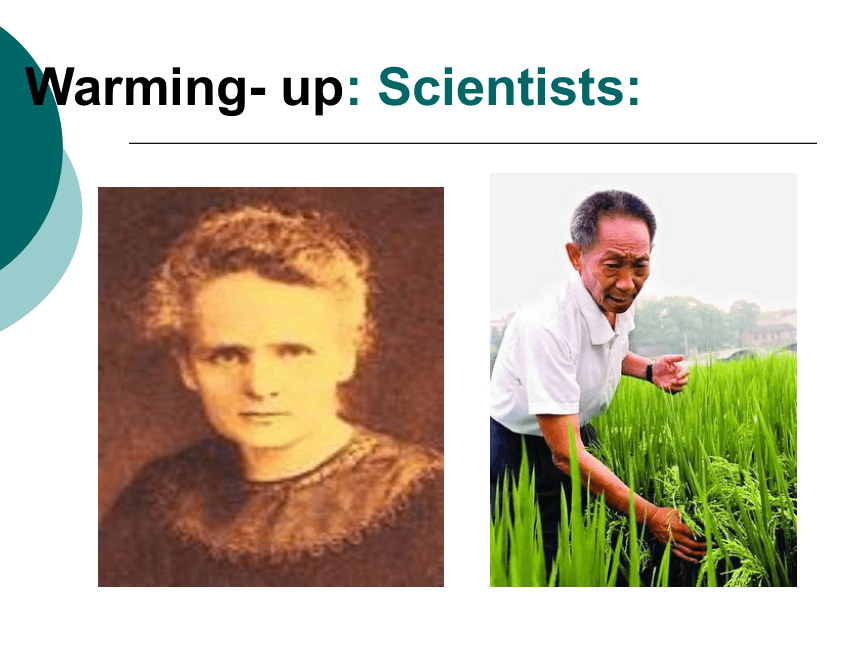
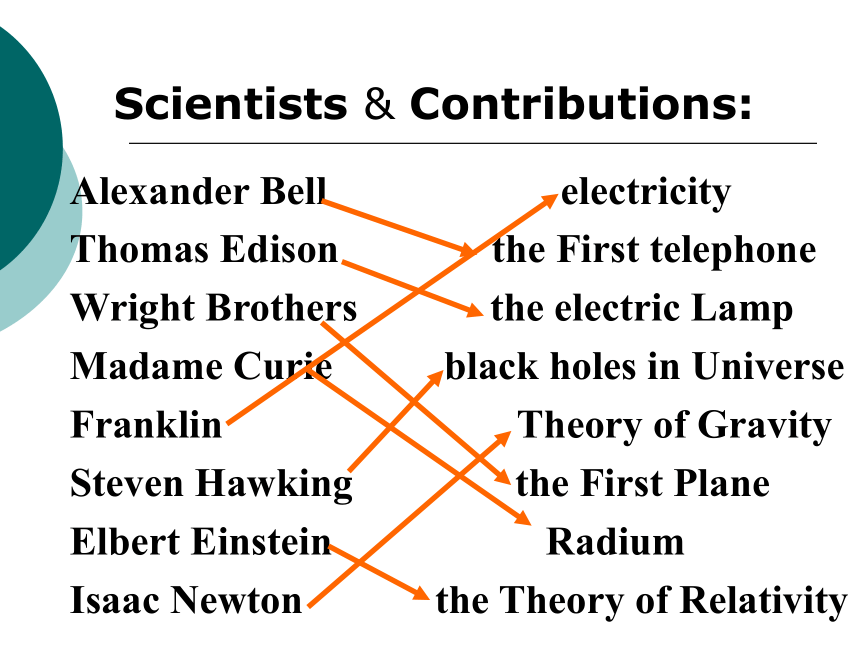
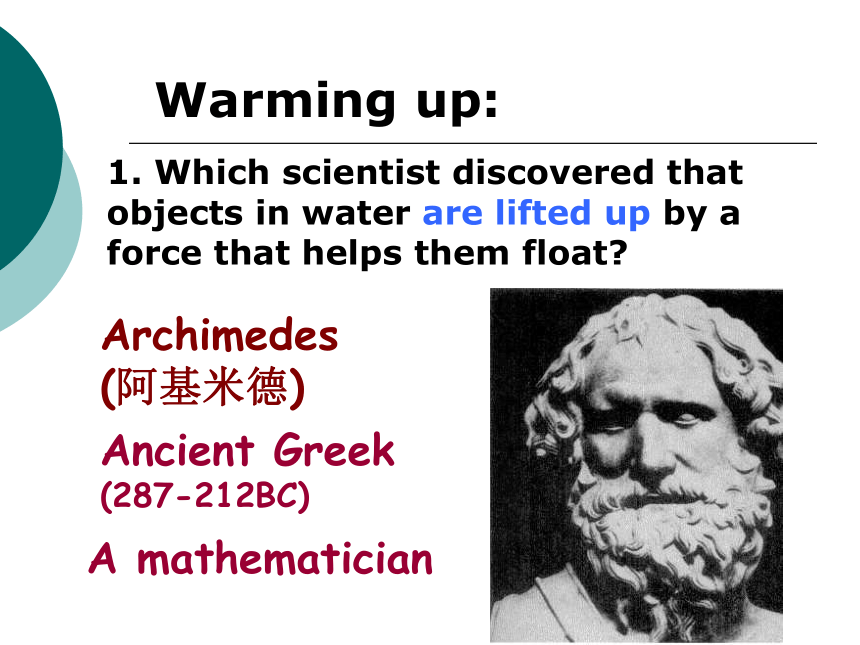
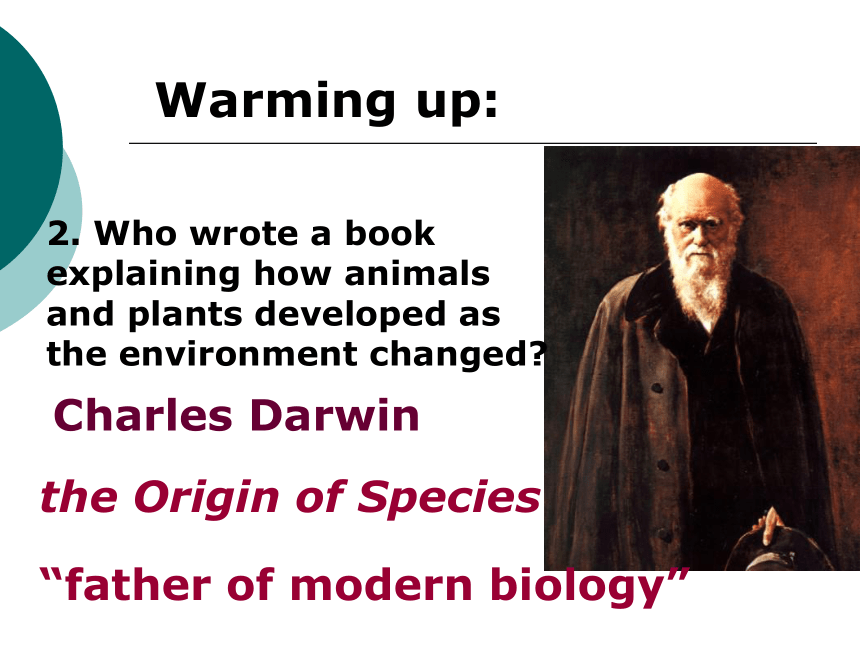
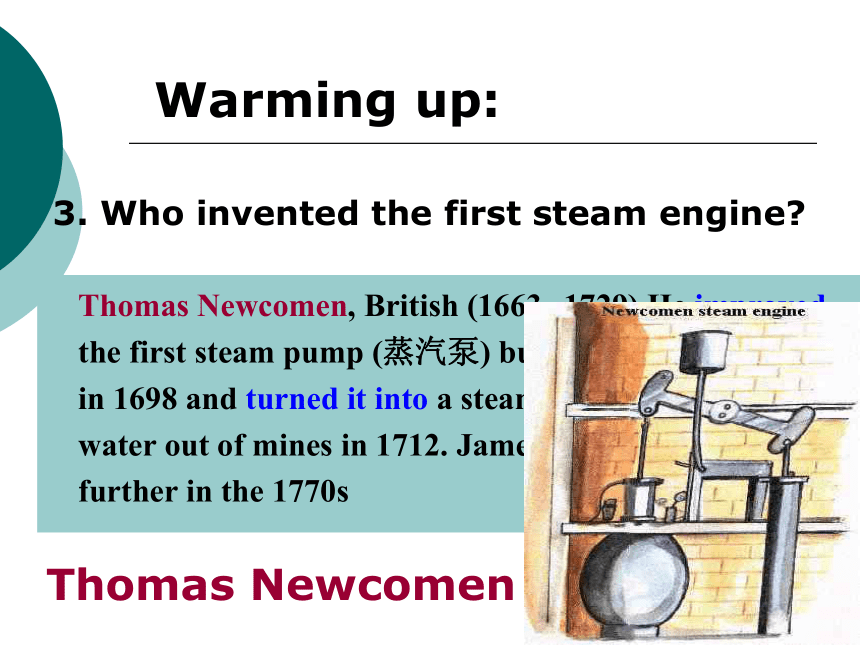
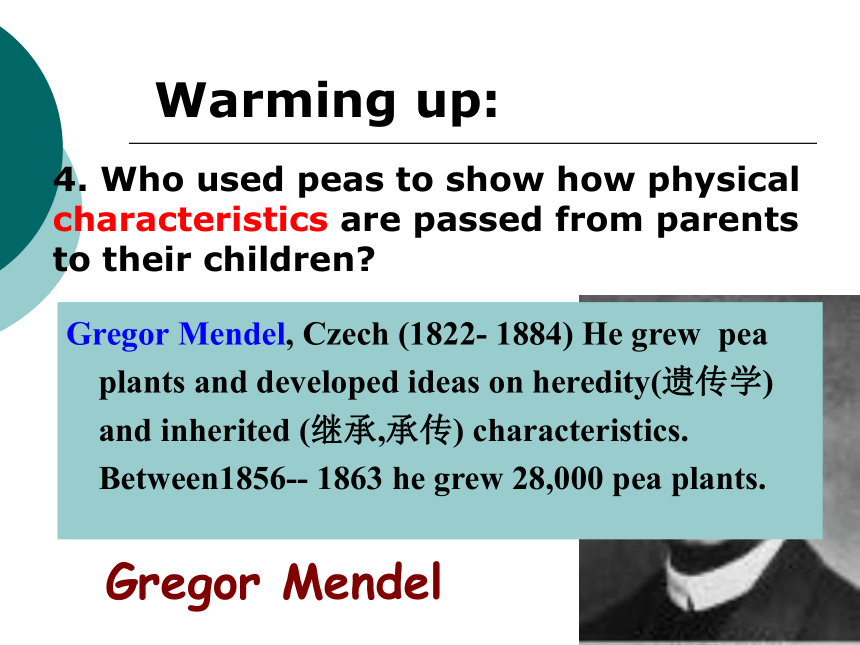
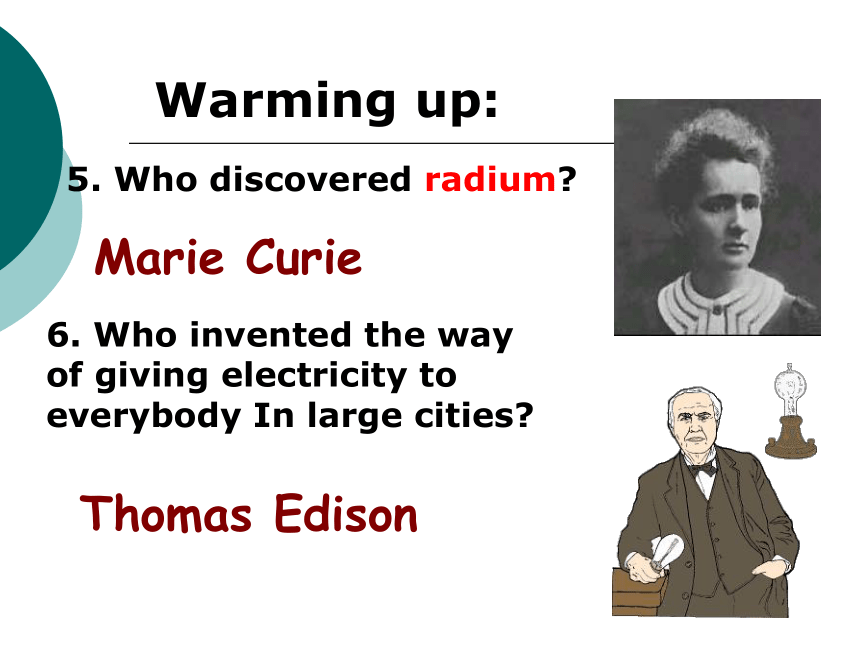
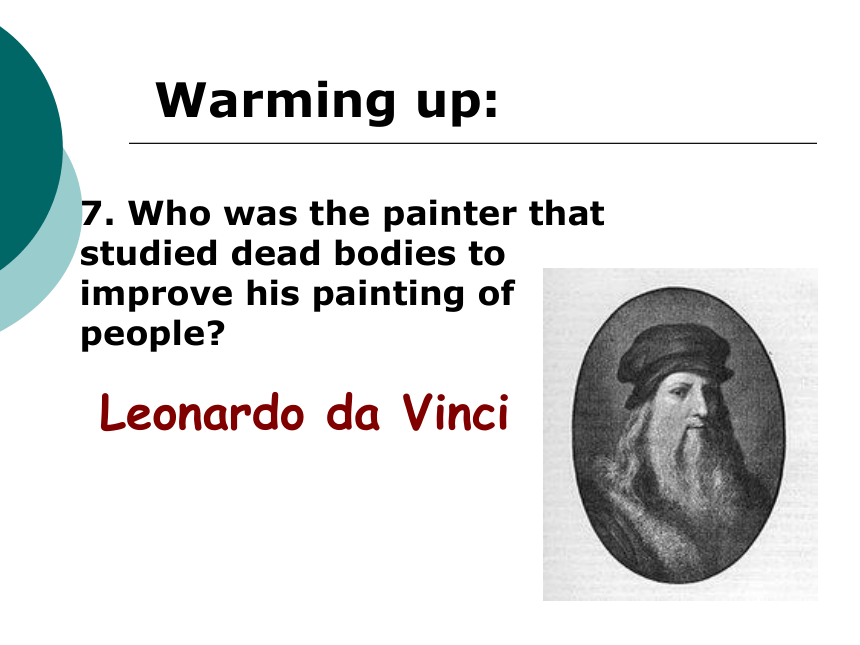
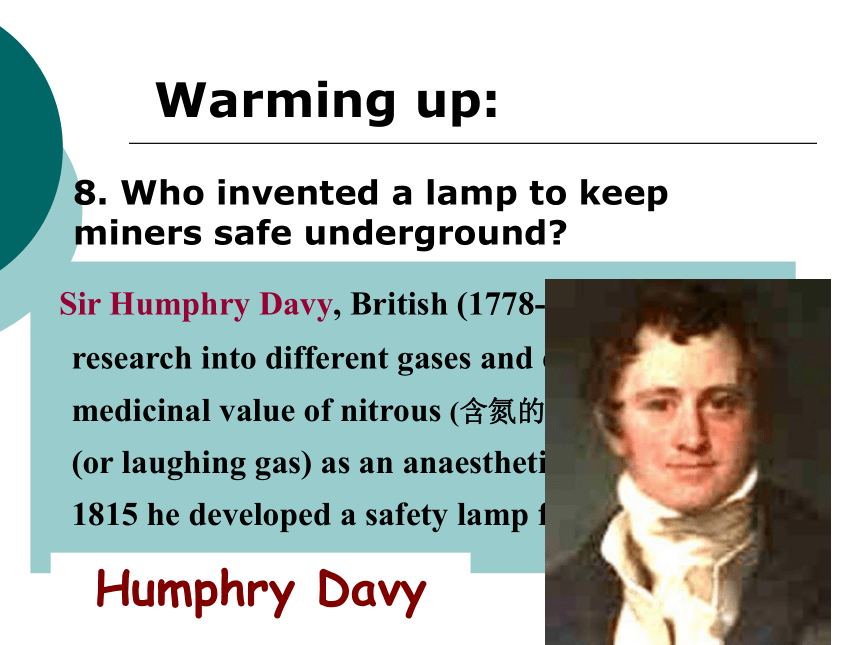
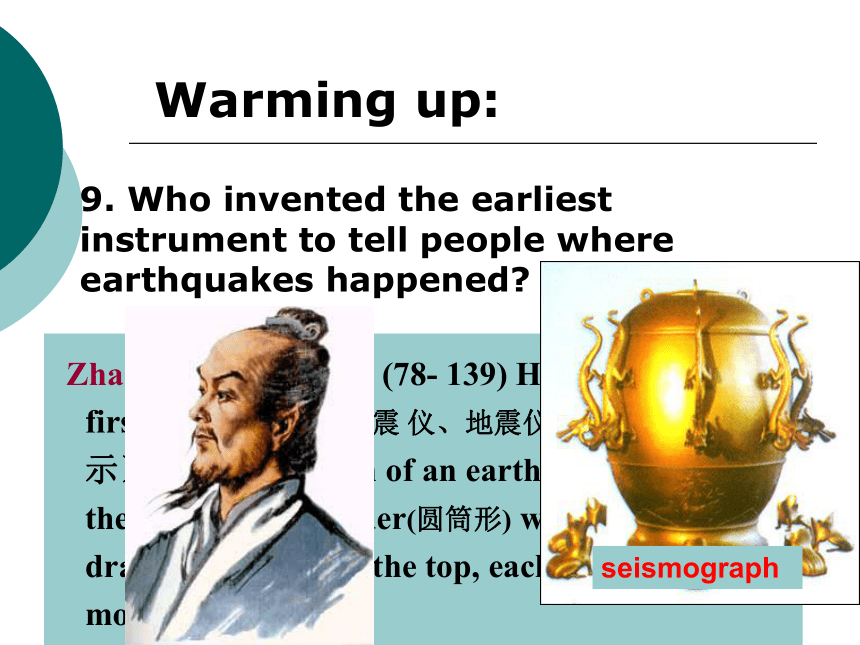
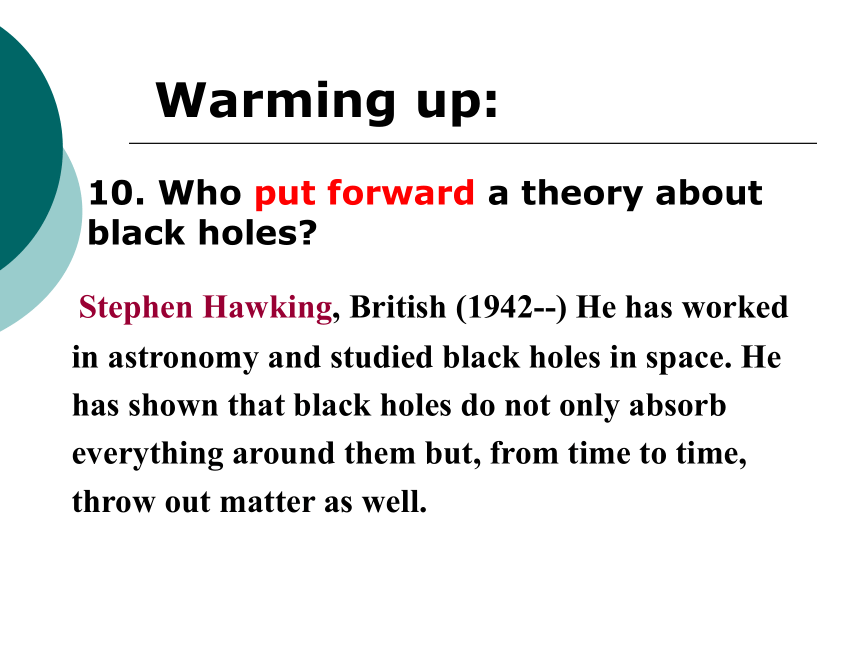
文档简介
课件102张PPT。Unit 1 Great ScientistsImportance: Without science and scientists, there would not be our modern society.
Qualities: good observation, perseverance, strong determination; careful, creative, strict, patient,…..
Warming- up: Scientists:Alexander Bell electricity
Thomas Edison the First telephone
Wright Brothers the electric Lamp
Madame Curie black holes in Universe
Franklin Theory of Gravity
Steven Hawking the First Plane
Elbert Einstein Radium
Isaac Newton the Theory of RelativityScientists & Contributions:Archimedes
(阿基米德)Warming up:1. Which scientist discovered that objects in water are lifted up by a force that helps them float?Ancient Greek
(287-212BC)A mathematicianCharles Darwin2. Who wrote a book explaining how animals and plants developed as the environment changed?the Origin of SpeciesWarming up:“father of modern biology”3. Who invented the first steam engine? Thomas Newcomen, British (1663--1729) He improved the first steam pump (蒸汽泵) built by Thomas Savery in 1698 and turned it into a steam engine for taking water out of mines in 1712. James Watt improved it still further in the 1770sThomas NewcomenWarming up:Gregor Mendel, Czech (1822- 1884) He grew pea plants and developed ideas on heredity(遗传学) and inherited (继承,承传) characteristics. Between1856-- 1863 he grew 28,000 pea plants.Gregor Mendel4. Who used peas to show how physical characteristics are passed from parents to their children?Warming up:Marie CurieWarming up:5. Who discovered radium?6. Who invented the way of giving electricity to everybody In large cities?Thomas EdisonLeonardo da Vinci7. Who was the painter that studied dead bodies to improve his painting of people? Warming up: Sir Humphry Davy, British (1778- 1829) He did research into different gases and discovered the medicinal value of nitrous (含氮的) oxide(氧化物) (or laughing gas) as an anaesthetic (麻醉剂). In 1815 he developed a safety lamp for miners. Humphry Davy8. Who invented a lamp to keep miners safe underground?Warming up: Zhang Heng, Chinese (78- 139) He invented the first seismograph(测震 仪、地震仪) to indicate(指示) in the direction of an earthquake. It was in the shape of a cylinder(圆筒形) with eight dragonheads round the top, each with a ball in its mouth. 9. Who invented the earliest instrument to tell people where earthquakes happened?Warming up:seismograph Stephen Hawking, British (1942--) He has worked in astronomy and studied black holes in space. He has shown that black holes do not only absorb everything around them but, from time to time, throw out matter as well. 10. Who put forward a theory about black holes?Warming up:Language points 1. Put forward
come up with/bring up/put up/bring forward
1) 提出 He put forward a very good suggestion at the meeting.
他在会上提出了一个很好的建议。
2) 把...向前拨 You ought to put your watch forward ten minutes.
你应该把表朝前拨快十分钟。
联想:put away/put aside/put off/put down/put on/put out/put up等
The theory was laughed at when it was first _______ (2010 南京质检)Put forward
Put aside
Put off
Put down
㊣We’re trying to put ______ a few hundred dollars monthly for emergency.
Put the books _____ after using them.
The meeting has been put ______ till next week.
We can put _______ at a hotel tonight.
I don’t know how you put ________ their constant quarreling.
She always put _______ her boyfriend, but he didn‘t seem to mind.(奚落)
asideawayoffupup withdown2. Scientific adj. [usually before noun] 1) involving science; connected with science:科学的,科学上的
a scientific discovery / study / adviser
scientific knowledge / research / instruments
2) careful and logical:符合科学规律的;系统的,精确的
He took a very scientific approach to management.
We need to be more scientific about this problem Science —— scientist—— scientific —— scientifically3. Conclude vt/vi 结束;推断出及物动词 vt. 1. 结束[(+by/with)] We concluded our meeting at 9 o'clock. 我们九点钟结束了会议。
2. 推断出,断定[W][Y][+that] What can you conclude from these observations? 你从这些观察中能得出什么结论?
3. (最后)决定(为)[+to-v][+that] He concluded that he would wait a little longer. 他决定再等一会儿。 He concluded to quit on pay day. 不及物动词 vi. 结束,终了[(+with)] The meeting concluded after two hours. 两小时后会议结束了。
conclusion n.得出结论 :
draw/reach a conclusion
arrive at a conclusion 总而言之
in conclusion
to conclude辨析:include/conclude/exclude exclude ? ?及物动词 vt. 拒绝接纳;把...排除在外;不包括[(+from)] The club excluded women from membership. 该俱乐部拒绝妇女入会。 4. analyse/analyze vt. 分析This book teaches you how to analyse what is causing the stress in your life.
n. analysis 分析;分解;解析[C][U][? n?l?sis]
eg. In the last analysis, the responsibility for this failure must lie with the chief engineer. 追根究底,失败的责任在于总工程师。 I was very much pleased by your analysis of the situation. 我非常满意你对形势的分析。
复数形式: analyses :[?'n?l?siz] 5. infect ?及物动词 vt. [(+with)] 1). 【医】传染;侵染;感染 The flu virus infected almost the entire class.
The entire class were almost infected with the flu virus. 全班几乎人人都染上了流行性感冒病毒。
2). 使受影响;感染 The captain's courage infected his men. 船长的勇气感染了他的船员。
3). 污染 The air is infected with noisome gases. 空气受到了有害气体的污染。
4). 腐蚀;使腐化n. Infection 1). 传染;侵染[U] Are you sure there is no danger of infection now? 你敢不敢肯定现在已经没有传染的危险了?
2). 传染病[C]
Ear infections are common in pre-school children
3). 影响;感染[U] He suffered from a lung infection. 他肺部受到了感染。 Adj. infectious 1). 传染的;传染性的 an infectious disease 传染病
2). 有感染力的,易传播的 an infectious grin
有感染力的笑
Their enthusiasm was infectious.
他们的热情有感染力。 ReadingPre-reading:SARSSARS is a serious disease which affects your ability to breathe.
SARS is an abbreviation of Severe Acute Respiratory Syndrome 【医】严重急性呼吸道综合症 (在中国俗称为“非典”, 即非典型性肺炎. infectious diseases :
They can be spread to other people.
They have an unknown cause.
They are difficult to cure.
They need public health care to solve them.Pre-reading:Skimming::Who was the great scientist in the passage and what was the deadly disease of its day?John Snow
cholera It begins in the stomach and a severe case can lead to death without immediate treatment.
Cholera is the illness caused by a bacterium(细菌) called Vibria cholerae. It infects people’s intestines(肠), causing diarrhea(腹泻), vomiting(呕吐) and leg cramps(痉挛). The most common cause of cholera is by
someone eating food or drinking water that has
been contaminated(受污染的) with the bacteria. TextThe title of the text is
_______________________________.
Let’s learn some knowledge about Cholera(霍乱).John Snow defeats “ King Cholera”Post-reading Answer the following questions.
How is the passage organized?
Number the important events in the time order.
Discuss stages in setting out a new scientific ideaHow is the passage organized?ProblemTheory 1Theory 2
Enquiry 调查SolutionJohn Snow began to test two theories.
An outbreak of cholera hit London in 1854.
John Snow marked the deaths on a map.
He announced that the water carried the disease.
John Snow investigated two streets where the outbreak was very severe.
King Cholera was defeated.
He found most of the deaths were near a water pump.
He had the handle removed from the water pump.Number these events in the time order that they happened.14286537draw a conclusion
Think of a method
Collect results
Make a question
Find a problem
Analyse the results
Find supporting evidence①③②④⑤⑥⑦Stages in setting out a new scientific idea:DicussingPara. 1Para. 3Para. 2Para. 5Para. 4Para. 6Para. 7Set out 陈述;阐明Careful Reading:John Snow was an doctor in London who Queen Victoria as her personal . He thought about helping ordinary people to cholera. Though the cause and the of it were unknown, he wanted to face
the and solve the problem. para.1expertattendedphysicianexposedcurechallengeCareful Reading:What were the two theories about the cause of cholera?
Which did John Snow want to prove?
What was his method of doing the research?
…multiplied… …victims…
…absorb… The second one.To gather information in two particular streets.para.2&3Careful Reading:para.4What did he do with the results of his enquiry?
What valuable clue did he get about the cause of the disease?
What might be the cause?
Marked on a map…Many of the deaths…
…had no deaths.It seemed that the water was to blame for cholera.Many of the deaths were near the water pump in Broad Street.Part of Snow’s Cholera MapCareful Reading:para.5Why did he tell people to remove the handle from the pump?
What happened after the handle was removed?
So that ……slowed downCareful Reading:
para.6&7Where did the woman live and what did she had delivered to her house every day?
What did their deaths suggest?
What measures did John Snow take to prevent the disease from spreading?Away from Broad Street
Water from the pumpThe polluted water carried the virus..suggested that…be examined
…were instructed not to expose…to…Find the main idea of each paragraph:
The causes of cholera
The correct or possible theory
Collect data on those where people were ill and died and where they got their water
Plot information on a map to find out where people died or did not die
Analyse the water to see if that is the cause of the illness.
Find other evidences to confirm his conclusion
The polluted dirty source of drinking water was to blame for the cause of the London cholera.Careful Reading:Language points1. expert ? ?英音:['eksp?:t] ? ?美音:['?ksp?t] ?
名词 n. [C] 专家;能手;熟练者[(+at/in/on)] She is an expert in training animals. 她是驯兽专家。= specialist
形容词 a. 熟练的,老练的;有经验的[(+at/in/on)] He became an expert language teacher. She is expert at making cheap, but stylish clothes Para.1联想expertly adv. 熟练地;讲演丰富地He operated the machine expertly.inexpert 无经验的 expertness n. 熟练2. attend vt. 照顾;护理;出席;参加1)照顾;护理;
Mr. Smith attended her in the hospital.
There was no one to attend him but Tina.
2)出席;参加
The meeting will be attended by finance ministers from many countries.
They attended college together at the University of Pennsylvania. attendant n. 服务员;侍者
attender n.出席者;参加者The?teacher?was?disappointed?to?find?that?not?many?students?had?______his?lecture. A.?joined??B.attended??C.joined?in??D.took?part?inattend是正式用语,及物动词,指参加会议,婚礼,葬礼,典礼;去上课,上学,听报告等。句子的主语只是去听,去看,自己不一定起积极作用。
join有两个用法:
(1)指加入某个党派,团体组织等,成为其成员之一,意为:“参军、入团、入党”等。如:
When did your brother join the army? 你哥哥什么时候参军的?
(2)和某人一道做某事,其结构为:join sb. in (doing) sth.,根据上下文,in (doing) sth. 也可以省去。如:
Will you join us in the discussion? 你参加我们的讨论吗?join in多指参加小规模的活动如“球赛、游戏”等,常用于日常口语。
take part in 指参加会议或群众性活动等,着重说明句子主语参加该项活动并在活动中发挥作用。如:
We'll take part in social practice during the summer vacation.
Lincoln took an active part in polities and was strongly against slavery.
Participate in =take part in 正式用词,特指参加团体活动,暗示以一个积极的角色参加。
go in for ?从事,参加;爱好
enter for 报名参加 Our team has entered for the competition.
attend vi. attend to 照顾;接待;料理;处理 If you attend to something, you deal with it. If you attend to someone who is hurt or injured, you care for them. Eg.The staff will helpfully attend to your needs.
The main thing is to attend to the injured.
Are you being attended to? (商店用语)
注:注意,倾听;致力 She didn't attend to what I was saying. 她并不注意听我所说的话。 The coach asked his staff to _______ the large group of journalists waiting for him to announce his training plans.
A. adapt to B. attend to C. refer to D. appeal to3. Expose vt. 使…暴露;揭露expose … to…
Don’t expose yourself to the sun for too long. You’ll get sunburned.
It’s very dangerous to be exposed to these viruses without any protection.
expose…as… 揭露…某人…为
John was exposed as a liar and cheatTravel abroad exposes children _______ different languages and cultures. A. to B. for C. with D. on
______ to the sun for long does harm to one’s skin.
A. Exposed B. Being exposed C. Exposing D. Expose4. Cure vt. 治愈;n. 治愈方法The doctor can not guarantee a cure ___ cancer.
The doctors cured him _______ cancer.
Eg. I don’t think the medicine is ____ of any effect. It has some ______.
A. cure; disadvantage B. a cure; advantage
C. cure;advantage D. a cure; disadantagesforoftreat/cure的区别
Cure “治愈;治好”,侧重于治疗的结果。
Treat “治疗”,侧重治疗的过程。
We will try to ____ the disease but we can’t guarantee to ____ it.
Cure sb of sth
Treat sb for sth
treat cure5. So many thousands of terrified people died every time there was an outbreak.Each time引导的是一个时间状语从句,=whenever。类似:each time, the first time, the moment, the minute, the instant, next time, by the time等
At the first time they met each other, they fell in love with each other.连词immediately / directly / instantly和词组the moment, the minute, the instant 意为“一……就……”,相当于as soon as。如:
The thief ran away the moment / directly he saw the policeman. 6. He knew it would never be controlled until its cause was found. 他知道,在找到病源前,疫情是无法控制的control v. to have power over, rule, direct 统治,控制
You are trying to control me as though I were your slave. 你是想把我当作你的奴隶控制。
The government tries its best to control prices. 政府努力控制物价。
He cannot control his anger. 他无法抑制自己的愤怒情绪。
n. 统治,控制,掌握
1) lose control of / be (go) out of control 失去控制
The driver lost control of his car and it knocked into a tree. 司机失去控制,车撞到树上。
The car was out of control and ran into a wall. 车失去控制,撞到了墙上。
2) in control of ……控制
Mr Brown is in control of the money. 布朗先生管理钱财。
3) under the control of 被……控制着
This money is under the control of Mr Brown. 钱财由一位布朗先生掌管。1. The second suggested that people absorbed this disease into their bodies with their meals. 第二种看法是在吃饭的时候人们把这种病毒引入体内的。Suggest
1)The disorganized meeting suggested bad preparation. 混乱的会场表明准备工作很差。
2) The chairman suggested leaving early for airport.
3) I suggest him to give up smoking.
I suggest him giving up smoking
I suggest that he (should) give up smoking.
4) His pale face suggested that he didn’t sleep well last night.
5) It is suggested that the meeting be put off.
6) It is my suggestion that the source of water supplies be examined.
My suggestion is that ………..
Para.2We’ll be free tomorrow, so I suggest ______ to the history museum.
A. to visit B. visiting
C. we should visit D. a visit2. absorb vt. & vi.
1) to take or suck in (liquids) 吸收
A sponge absorbs water. 海绵吸水
absorb…into… 吸收
The big company has gradually absorbed these small companies into its own organization.这家大公司渐渐把这些小公司吞并了
2) to take in (knowledge, ideas) 专心于;全神贯注于…
be absorbed in …
The little girl was absorbed in reading a tale. 这个小姑娘正在全神贯注地阅读一篇故事
They are still sitting on the sofa, _____ in conversation.
A. absorbing B. absorbed
C. being absorbed D. to absorb
3. The affected person diedaffect vt.
1.影响;对...发生作用
The news did not affect her at all.
=The news had no effect on her at all.
The amount of rain affects the growth of crops.
2. 使感动,使震动
She was deeply affected by the news of her father's death.
3. (病)侵袭;罹患
Her kidneys had become affected. Para. 3 1. Suspect
vt. 怀疑;以为
She strongly suspected that her husband had been lying.
He is suspected of murder.
n. 被怀疑者;嫌疑犯
Two suspects were arrested today in connection with the robbery.
adj. 不可信的
The evidence against the four Irishmen was suspect.区别:suspect和doubt 都有“怀疑”的意思,但实际上它们的用法还是有区别的。下面我们就来比较一下: 一 . 如果后面接名词、代词或名词性词组时,两者基本上可通用。例如:
I doubt/suspect the truth of her statement. 我对她那番话的真实性表示怀疑。
He says he can cure me, but I still doubt/suspect him. 他说他能治好我的病,但我仍对他不放心。 二 . 如果后面接 that 从句,意思就截然不同。 doubt 意为“无把握;不相信( question the truth of; don't believe/think )”,怀疑其无。 suspect 意为“有存在或属实的想法;相信( have an idea of the existence; believe; guess )”,怀疑其有。例如:
I doubt that he has stolen my watch. 我不相信他偷了我的手表。
I suspect that he has stolen my watch. 我怀疑 / 猜想他偷了我的手表。
The doctor suspected that he was ill with flu. 医生怀疑 / 认为他得了流感。
这时 doubt 更多用于否定句或疑问句中。如:
I don't doubt that he is right. 我确信他是对的。
I didn't doubt that he would come. 我当时相信他会来的。
Why did she doubt that they were cheats? 她为什么怀疑他们是骗子?
三 . doubt 用于肯定句中时,多接 whether/if 引导的从句,意义与 that 从句不同,这时意为“不敢肯定( feel uncertain about )”。而 suspect 不可接这种从句。例如:
I doubt whether/if he'll come. 我不敢肯定他来不来。
It's raining hard. I doubt whether it will be fine tomorrow. 雨下得很大,我不敢说明天会晴。
四 . 其他搭配。
doubt 可作不及物动词,用于 doubt of sth; suspect 用于 suspect sth to be, suspect sb of(doing) sth 。例如:
She never doubted of his success. 她从不怀疑他的成功。
I suspected him to be the spy. 我认为他就是那个间谋。
What made you suspect her of having taken the money? 你凭什么怀疑钱是她偷的? 2.Severe adj 1. 严重的;剧烈的;凛冽的 He has been under a severe strain. 他一直处在极度紧张状态之中。
2. 严厉的;苛刻的[(+with/on/upon)] My uncle became severe when I was late. 当我迟到时,我的叔父变得严厉起来。
3. 严格的;严密的 I was impressed by his severe reasoning. 他严谨的推理给我留下了深刻的印象。
4. 严峻的;艰难的;激烈的 We are suffering from a severe shortage of fuel. 我们苦于严重缺乏燃料。
5. 严肃的,正经的 He spoke in a severe voice. 他严肃地说。
6. 纯洁的;朴素的 She wore a severe black dress. 她穿一件朴素的黑衣裙。 Para.4 It is hard to foresee what will happen. 很难预知将会发生之事。 He foresaw that prices would drop. 他预见到物价会下跌。 Nobody could foresee his running away. 没人预见到他的逃跑。 We should have foreseen the trouble months ago. 我们几个月前就该预见到这一困难。 1. Foresee 预见;预知[+v-ing][+(that)][+wh-] 辨析:foresee/forecast/foretell/predictforesee对将要发生的事形成一种概念或判断,
如She foresaw that the train would be delayed by bad weather.她预计火车会因为坏天气而晚点
predict“预言”“预示”,常用词,较正式,指根据事实、经验、自然定律等来判断未来的事情,带有“科学准确性”,如The astronomer predicts the return of comet.那个天文学家预言到该彗星的重返。
foretell着重对未来事件的宣布,对于预言是否准确,预言者的能力如何,预言的根据等不太重要,如The boatman usually can foretell weather.船夫常能预言天气。
forecast主要指天气,气象预报.如The weather forecast on the radio tonight tells of coming storms.今晚收音机的天气预报报告将有暴风雨。 2. It seemed that the water was to blame请看下面两道高考题:
1.The mother didn't know ______to blame for the broken glass as it happened while she was out. (NMET2002)
A. who B. when C. how D. what
2. I feel it is your husband who ______for the spoiled child.(2002年上海高考)
A.is to blame B. is going to blame
C. is to be blamed D. should blame一、blame用作及物动词时,通常用于下面三个句型:
1. blame sb. for sth. /doing sth. 为某事责备某人/责备某人做了某事。
如:Many children are afraid of being blamed for making mistakes in speaking English. 许多孩子害怕讲英语时犯错误而受责备。
His companion, blamed for the accident, had not been driving carefully. 他的同伴没有谨慎驾驶,应对事故负责。
2. blame sth. on sb. 把某事归咎于某人。
如:The police blamed the traffic accident on Jack‘s careless driving. 警察把那起交通事故归咎于杰克的粗心驾驶。
It‘s no use blaming our defeat on him. 把我们的失败归罪在他头上是没用的。
3. be to blame (for)应(为……)承担责任;该(为……)受责备。[注意]此处不能用被动语态。
如:The children were not to blame for the accident. 那次事故怪不着孩子们。
Who is to blame for starting the fire? 这场火灾该由谁负责?
I am in no way to blame. 决不该责备我。二、 blame用作名词时,常用于下列搭配:
1. accept/ bear/take the blame for sth. 对某事负责任。
如:You must bear the blame for the accident. 你必须承担造成这次事故的责任。We were ready to take the blame for what had happened. 我们愿对所发生的事负责。
2. put/lay the blame for sth. on sb. 将某事归咎于某人。
如:She‘ll put the blame on us if it turns out badly. 如果结果糟糕,她将会怪罪于我们。
He is trying to lay the blame on me. 他企图把责任推给我。
Be to do 的用法一般说来,“be to do”这个结构有两种语法意义,其一是连系动词be+动词不定式做表语,其二是be to是一个独立词汇单位,具有情态含义,可以把它叫做情态习语(modal idiom)。
一、be +动词不定式,不定式做表语,表示主语和表语在概念上是等同的。如:
The problem is to find a solution.
His plan is to clean the room.
My wish is to be a doctor. 二、be to +动词不定式中的be to用作情态习语,这时的be to do表示: “计划”、“安排”、“义务”、“应该”、“可能”、“命运”等。(have to, ought to)。
1.表示“将”、“计划”、“安排”。(意思接近于be going to)如:
Their daughter is to get married soon.
It was the last film at the cinema,which was to close next day.
was/ were to do表示过去曾经计划要做的事,或者过去应当做的事,而且从现在的角度来看已经实现了。如:
I felt nervous because I was soon to leave home for the first time.
The expedition was to start in a week’s time.
was/ were to have done,表示“本打算”、“本计划”或“本应当”做的事而没有做成或没有发生。如:
I was to have seen him last Wednesday, but he didn’t come.
We were to have been married last year.
2.表示“义务”、“应该” 。(意思接近于should, must, ought to, have to)如:
No one is to leave the building.谁也不得离开这楼房。
You are not to smoke in this room.=You are not supposed to smoke in this room.
You are to be back by 10 o’clock.你必须十点以前回来。
3.表示可能性,相当于can, may如:
Such books are to be found in the library.这样的书在图书馆里就能找到。
Not a single sound was to be heard.一点儿声音也听不到。
Not a soul was to be seen.看不到一个人影。
She was nowhere to be found.哪儿也找不到她。
She was never to see his wife and family again.
4.表示“命运”,将来必然要发生的事,译作“注定……”。如:
The worst is still to come.
They said goodbye, little knowing they were never to meet again.
5.用于“if…were to do”,表示虚拟语气。如:
If it were to rain tomorrow, the sports meeting would be put off.如果明天下雨,运动会就会延期。
Para. 51. Look into: If a person or organization is looking into a possible course of action, a problem, or a situation, they are finding out about it and examining the facts relating to it.
=investigate 研究;调查
eg. John snow looked into the source of the water for these two streets.
look on/look after/look up/look up to/look up at/look down upon/look away/look back on/look around
2. polluteVt. 污染;弄脏
eg. The river was polluted by the factory.
n. Pollutant 污染物
pollution 污染
Adj. polluted 受污染的
be polluted with/by…
eg. Something must be done to prevent the river from ___________ (pollute)
Pollute one’s mind 毒害某人的心灵being polluted3. handlen. 1)柄;把手
I turned the handle and opened the door. 2) 可乘之机,把柄,口实 Don‘t let your conduct give any handle for gossip. 别让你的行为成为人家说三道四的话柄。
vt.操作;操纵;指挥;管理 He knows how to handle the machine. We all have to learn to handle stress
Handle yourself 把握自我
Eg. Here is advice on how to handle yourself in an interview. 这是有关在面试中如何自控的建议。
Handle well/badly 容易操纵;不宜操纵
Eg. The car handles well, even on wet roads.
表“对付;处理”时,可用handle、deal with, cope withPara. 61.Link …to…
1) 把…和…连接起来;link…to/with
The video cameras are linked to a powerful computer.
The Channel Tunnel links Britain with the rest of Europe.
2) be linked to…/be connected with 和…有联系
The two factors are directly linked. 这两个因素直接联系在一起。
The personal and social development of the child are inextricably linked.儿童在自身和社会交往两方面的发育成长是相辅相成的。
2. announce vt. 1). 宣布,发布
They announced that she would give one extra song. 他们宣布说她将再唱一首歌。 The vote was completed. The chairman announced the result. 投票完毕。主席宣布了结果。
It was announced that the groups have agreed to a cease-fire.
2) (通过广播)通知
They announced that the flight would be delayed.
3) Announce yourself/sb 宣布…到达;通报…的到来
Would you announce the guests as they arrive?
make an announcement 宣布
eg. Silent, please. Mr. Smith has an announcement to make.
announcer n. 广播员;播音员;节目主持人。辨析:declare 和announce announce 和declare 语义相近,但结构有区别。
announce 更接近于汉语“公布”、“告知”的意思,它所涉及的是一件对方原来不知道的事。后接名词或代词或that宾语从句。
而declare 正式地在重大场合,重要事情的官方宣布,如宣战、宣布独立等。含有庄严宣告或交代清楚的意思,它所涉及的事不一定是对方所不知道的。除接名词、代词和宾语从句外,还可接复合宾语等结构。
declare在语义上还有些特殊的用法。
试比较下列句型。
Soon Germany declared war on France. 不久德国对法宣战。(不用 announce)
The bell announced the end of the class. 下课铃响了。(非正式,不用declare)
但有时两个词用在同一句中都说得通。
The committee announced/declared the results of the experiment. 委员会宣布了实验的结果。 The leader _____ the meeting open. A. stated B. spoke C. announced D. declared declare + sth/sb + (to be) adj/noun
Para. 7 instructVt.
1)命令;指示 we have been instructed to offer you every assistance.
They haven’t instructed us where to go.
2) 教导;训练;指导 The professor instructed us to do the experiment.
3)通知;告知 My agent has instructed me that you still owe me $150.
Instruction n.
Always read the ____ on the bottle carefully and take the right amount of medicine.
A. explanations B. instructions
C. descriptions D. introductions
用法说明;操作指南Instruct sb to do sth 指导…做…
Instruct sb in sth 在…教导某人
Learning about language contributeThe results of the scientific experiments are valuable to us and they will _______ the success of our research.
contribute to B. stick to
C. expose to D. result to1 [VERB] If you contribute to something, you say or do things to help to make it successful.贡献;出力
The three sons also contribute to the family business... He believes he has something to contribute to a discussion.
2 [VERB] To contribute money or resources to something means to give money or resources to help pay for something or to help achieve a particular purpose.捐献;捐款
The US is contributing $4 billion in loans, credits and grants... NATO (北约)officials agreed to contribute troops and equipment to such an operation. = donate3 [VERB] V to n, V-ing If something contributes to an event or situation, it is one of the causes of it.导致;致使
The report says design faults in both the vessels contributed to the tragedy... Stress, both human and mechanical, may also be a contributing factor.
4 [VERB] V to n, V-ing If you contribute to a magazine, newspaper, or book, you write things that are published in it.投稿 I was asked to contribute to a newspaper article making predictions for the new year... contribution n. 捐献;贡献;捐助 contributor n. 捐助人;投稿人;贡献者 make a contribution to (doing) sth eg. China is ready to make its contribution to the realization of this goal ."中国愿为实现这一目标作出自己的贡献。 The present financial crisis has greatly contributed to thousands of workers _______ and many factories ______.
A.Laying off,closed down
B. laid off,closed down
C.Laid off, closing down
D. being laid off, closing down2. as well as
in addition to
besides
apart from除了……
还有
1) In addition to apples you asked for, I bought you some oranges.except (for)
but
apart from除去
2) The restaurant is open except Sunday.
3) Apart from his nose, he is a good-looking man.
4) Everyone was here but him.
quite apart from 不考虑;撇开…不说 eg. Quite apart from the cost, there is the question of your health to be considered. 且不说开销,你的健康问题应该考虑吧。
The general Store sells clothing and many other things ______ food.
A. in addition B. except for
C. apart from D. besideDoes what he said ______ any ______ ?
2. Is Steve very __________ his children in their study?
3. The reform project _____________ by Mr. Smith is being discussed at the meeting now.
4. The police are ____________ the case in which two
persons were killed.
5. Who ____________ for the pollution of our earth?
6. Don’t __________________ in such a hurry.
7. After the firemen’s effort, the fire____ finally ___________ .
8. We should learn English _________ other five subjects.
9. Father _____totally____________ the newspaper.make sensestrict withput forwardExercise: Complete the sentences using suitable phrase. looking into is to blame draw a conclusionput forward, draw a conclusion, be to blame for sth,
apart from, be strict with, be absorbed in,
be in control , look into, make sense, was in control apart from was absorbed inLi Ming likes reading books on _____________. ______
_____ he reads such a book, he __________ in it.
He likes to ______ scientific ways ____ studies.
__________ , he is ________ his studies.
3. We all _________________________ science when at college. ______ he ___________________!
great scientists Every time is absorbed In addition strict in Complete the sentences according to the Chinese. link to suggest that he should study
If only could be a scientist
李明喜欢看关于伟大科学家的书。
每次看这种书,他都会沉迷下去。
他还喜欢把科学方法联系到学习上。
除此之外,他对自己的学习要求严格。
我们都建议他到大学学理科。
要是他能成为一名科学家就好了!Reading1.What was the theory before Copernicus?
2. Why was Copernicus feel frighten and confused?
3. What was Copernicus theory?
4. How did Copernicus explain his theory?
5. When on earth was his theory published publicly?
6. What significance does Copernicus’s theory have?1.What was the theory before Copernicus? 2. Why was Copernicus feel frightened and confused? The earth was created by God and the earth must be the center of the solar system.Confused: Whether he should tell his anyone about his theory that the sun was the center of the solar system.
Frightened: The Christian Church would have punished him for even suggesting such an idea.3. What was Copernicus theory?
4. How did Copernicus explain his theory?
5. When on earth was his theory published publicly?
6. What significance does Copernicus’s theory have?
The earth was not the center of the solar system but the sun with planets going around it. The earth was spinning as it went round the sunBy collecting observations of the stars and using all his mathematical knowledge.Before his death in 1543There is a direct link between his theory and he work of Isaac Newton, Albert Einstein and Stephen Hawking.Writing — Page 8 假如你是李华。你对天文学有浓厚的兴趣。假想你生活在他那个年代,请给哥白尼写一封信,说出合适的理由劝说其把他的新理论发表出来,公布于众。字数不少于100字。Dear Copernicus,
I am a student interested in astronomy and I would very much like to read your new theory about the solar system, hoping you will publish it for several reasons as follows.
To begin with, there are some confusing problems people can not understand by way of the present theory, such as the changing brightness of some stars. What’s more, as far as I know, your observations have been very carefully carried out over many years. Now you should have the great courage to publish them. Besides, I know you worry about what will happen if publishing your new theory. No matter how people oppose it, time will show whether your ideas are right or not. Last but not least, science can never advance unless people have the courage of publishing their beliefs.
All in all, I hope you will publish your new theory in no time. Only when you do this can our society progress.
Yours
Lihua
Complete the sentences according to the Chinese. 1. _____ you put the sun there ______________ of other planets in the sky ________.
只有当你把太阳放在中心位置上,天空中其他行星的运动才能说得清楚。
2. Copernicus had _________________ about these problems and tried to find an answer.
哥白尼对这些问题苦苦思索过很久,试图找出问题的答案。
3. He placed a fixed sun at the centre of the solar system with the planets ___________ it and only the moon still ________________.
他把太阳固定在太阳系的中心位置上,而行星围绕着太阳转,只有月球仍然绕着地球转。Only ifdid the movements make sense thought long and hard going around going around the earth4. Yet Copernicus’ theory is now the basis ________ all our ideas of the universe are built.
然而,哥白尼的理论却是现在我们宇宙观赖以建立的基础。
5. So he only published it as he _________ in 1543.
所以他只是在1543年临终前才把它公布出来。
6. Now people can see that __________________ between his theory and the work of Isaac Newton.
现今人们可以看到,他的理论与艾萨克. 牛顿等人的研究有着直接的联系。 on which lay dying there is a direct linkI wake up only if the alarm clock rings.
只有闹钟响了,我才会醒。
2) Only if the alarm clock rings do I wake up.
3) If only I could fly like a bird!
要是我能像小鸟一样飞多好啊!
4) If only he were alive!
要是他活着多好啊!
5) If only I had listened to my parents! 我要是当时听了父母的话就好了。1. only if “只有”
if only “只要就好了/要是……多好”常放句首表虚拟Language points if only 与 I wish一样,也用于表示与事实相反的愿望,其后所虚拟语气的时态与 wish后所接时态的情况相同。
【注】if only 通常独立使用,没有主句。
2. make sensemake sense
have an understandable meaning 有意义; 有道理; 讲得通: What you say makes no sense. 你说的话没有道理. These words are jumbled up and don't make sense. 这些词藻堆砌在一起讲不通.
(b) be sensible 是明智的; 是合情理的:
It would make sense to leave early. 还是早点儿走好.
make sense of sth: understand sth difficult or apparently meaningless 理解或弄懂困难的或似无法理解的事物: Can you make sense of this poem? 你看得懂这首诗吗?
out of one's senses: not in one's normal state of mind; foolish 精神不正常; 愚蠢: You sold it? You must be out of your senses! 你把它卖了? 你简直是疯了!
see sense: start to be sensible 明白事理: beat, knock, drive, etc (some) sense into sb (infml 口):change sb's behaviour, views, etc by severe or sometimes violent methods 改变某人的行为﹑ 看法等(用严厉的, 有时为粗暴的方式):
She's a wild uncontrollable girl, but that new school should knock some sense into her. 她是个很不听话的女孩儿, 那所新学校应该能管管她了.
bring sb to his/come to one's senses (a) (make sb) stop behaving foolishly or irrationally (使某人)不再做傻事或不理智的事: He was finally brought to his senses and agreed to let the hostages go. 他最後恢复些理智, 同意释放人质. (b) wake (sb) up from unconsciousness 使(某人)苏醒: When I came to my senses, I was lying on the floor. 我苏醒过来的时候是在地板上躺着呢. in a sense: if the statement, etc is understood in a particular way 在某种意义上: What you say is true in a sense. 你的话在某种意义上属实.
in one's senses in one's normal state of mind; sensible 头脑健全; 神志清醒: No one in their right senses would let a small child go out alone. 凡是有理智的人, 谁都不会让那麽小的孩子独自出门.
There's no sense in (it is not sensible) worrying about it now.
Can't you talk sense (= say sth sensible)? Talk nonsense
There's a lot of sense in what Mary says.
The manager has a good business _____, so the company is going well.
A. idea B. sense C. thought D. thinking
a sense of business 经商意识
a sense of direction 方向感
a sense of emergency 紧迫感
a sense of guilty 内疚感
a sense of duty 责任感
a sense of humor 幽默感
common sense 常识 3. positive1)Be ~ (about sth/that...): (of a person) confidently holding an opinion; convinced (指人)有把握的, 确信的:
Are you absolutely positive that it was after midnight? 你是否有绝对把握认为那事是在午夜以後发生的?
It was definitely his fault —— James was positive of that.
2) thinking about what is good in a situation; feeling confident and hopeful 积极的 反义词:negative
a positive attitude/approach/outlook 积极的态度/方法/人生观
You’ve got to be more positive about your work. 你必须更积极地对待自己的工作。4. reject1) refuse to accept (sb/sth) 拒绝接受(某人[某事物]):
reject a gift, a suggestion 拒绝接受一件礼物﹑ 一项建议
She rejected his offer of marriage. 他向她求婚, 她拒绝了.
After the transplant his body rejected (i.e failed to adapt to) the new heart. 他的身体对新移植的心脏产生排斥作用.
2) put (sth) aside or throw (sth) away as not to be used, chosen, done, etc; discard 抛弃(某事物); 摈弃; 剔除: Imperfect articles are rejected by our quality control. 我们进行质量检验时, 有缺陷的产品均予剔除.
we are asking people to ________ good from companies that use children labor.
A. refuse B. resist C. reject D. boycott
boycott 联合抵制(货物);拒绝购买
辨析:reject/refuse/decline/resist/turn down
语气:reject 语气比 refuse 强,表示断然拒绝。如果不同意一种意见或信仰,要用 reject。decline 比较正式,表示礼貌、客气地“婉拒”。当表示对于对方的邀请、请求、提议等表示“不接受”时,可以用 decline 来缓和语气。turn down 用在非正式场合,尤其是在美国英语中,可与 reject 替换。 reject > refuse > turn down > decline
搭配:Refuse to do sth. Refuse (sb) sth.
Reject有名词词性,比如:被拒之人,之物。作为及物动词,Reject sth. Reject doing sth.
Resist vt.
1. 抵抗,反抗;抗拒 The nation was unable to resist the invasion.
2. (常用于否定句)忍耐,忍住[+v-ing]
Resist sth. Resist doing sth.(否定句,忍耐)
Turn sth./sb. down
Deny 意为:否认;不承认
1)deny +名词 / 动名词,意为“否认;不承认”。 The accused man denied the charge against him in the court. 在法庭上,被告否认了对他的控告。 The president has denied having made any statement to that effect. 总统否认曾就那件事做过任何声明。
2)deny + that从句,意为“否认(某事或某说法)”。 The driver denied that he was responsible for the car accident. 司机不承认在这次车祸中的责任。 I can not deny that the failure of my eyesight has been a heavy blow to me. 不可否认我的视力衰退对我是个严重的打
3)deny + oneself + to +名词,意为“拒不”。
I told my wife to deny myself to any callers. 我对妻子说无论谁来拜访,我都不见。 5. Although he had tried to ignore them, all his mathematical calculations led to the same conclusion; that the earth was not the centre of the solar system.Although 引导的让步状语从句; that 引导同位语从句
________, he could not lift the weight.
A. Strong while he was
B. However strong he was
C. Strong though he was
D. Strong although he was lead to lead sb to do sth 使…做某事
Her constant lying led me to distrust everything she said. 她总撤谎, 我完全不相信她的话了.
2)lead to (sb/sth) doing sth: have sth as its result 导致某种结果: = result in
This misprint led to great confusion. 这个印刷错误造成很大的混淆.
Lead sb to s.p 领某人去某处
He led the group out into the garden. 他把那些人领出去进了花园.
4)lead to s.p :a route or means of access 通; 达:
The road leads to the foot of the hill. The discovery of new evidence led to ________.
A. the thief having caught
B. catching the thief
C. the thief being caught
D. the thief to be caughtlead sb by the nose 牵着某人的鼻子走; 完全控制某人.
lead sb a (merry) dance 给某人造成极大麻烦(尤指令其跟着东奔西跑)
lead a dog's life 过狗一般的生活(长期忧虑﹑ 痛苦或悲伤).
lead sb a dog's life 使某人生活痛苦不堪.
lead sb to believe (that)... cause sb to believe (sth that is false or uncertain) 使某人相信(某假事或不确之事).
lead sb up the garden 欺骗某人.
lead the way (to sth) go first; show the way 先行; 带路:
Our scientists are leading the way in space research. 我们的科学家在宇宙探索中处於领先地位.
lead up to sth 於某事之先作准备﹑ 引进或进行:
the events leading up to the outbreak of war 导致战争爆发的事件.
Qualities: good observation, perseverance, strong determination; careful, creative, strict, patient,…..
Warming- up: Scientists:Alexander Bell electricity
Thomas Edison the First telephone
Wright Brothers the electric Lamp
Madame Curie black holes in Universe
Franklin Theory of Gravity
Steven Hawking the First Plane
Elbert Einstein Radium
Isaac Newton the Theory of RelativityScientists & Contributions:Archimedes
(阿基米德)Warming up:1. Which scientist discovered that objects in water are lifted up by a force that helps them float?Ancient Greek
(287-212BC)A mathematicianCharles Darwin2. Who wrote a book explaining how animals and plants developed as the environment changed?the Origin of SpeciesWarming up:“father of modern biology”3. Who invented the first steam engine? Thomas Newcomen, British (1663--1729) He improved the first steam pump (蒸汽泵) built by Thomas Savery in 1698 and turned it into a steam engine for taking water out of mines in 1712. James Watt improved it still further in the 1770sThomas NewcomenWarming up:Gregor Mendel, Czech (1822- 1884) He grew pea plants and developed ideas on heredity(遗传学) and inherited (继承,承传) characteristics. Between1856-- 1863 he grew 28,000 pea plants.Gregor Mendel4. Who used peas to show how physical characteristics are passed from parents to their children?Warming up:Marie CurieWarming up:5. Who discovered radium?6. Who invented the way of giving electricity to everybody In large cities?Thomas EdisonLeonardo da Vinci7. Who was the painter that studied dead bodies to improve his painting of people? Warming up: Sir Humphry Davy, British (1778- 1829) He did research into different gases and discovered the medicinal value of nitrous (含氮的) oxide(氧化物) (or laughing gas) as an anaesthetic (麻醉剂). In 1815 he developed a safety lamp for miners. Humphry Davy8. Who invented a lamp to keep miners safe underground?Warming up: Zhang Heng, Chinese (78- 139) He invented the first seismograph(测震 仪、地震仪) to indicate(指示) in the direction of an earthquake. It was in the shape of a cylinder(圆筒形) with eight dragonheads round the top, each with a ball in its mouth. 9. Who invented the earliest instrument to tell people where earthquakes happened?Warming up:seismograph Stephen Hawking, British (1942--) He has worked in astronomy and studied black holes in space. He has shown that black holes do not only absorb everything around them but, from time to time, throw out matter as well. 10. Who put forward a theory about black holes?Warming up:Language points 1. Put forward
come up with/bring up/put up/bring forward
1) 提出 He put forward a very good suggestion at the meeting.
他在会上提出了一个很好的建议。
2) 把...向前拨 You ought to put your watch forward ten minutes.
你应该把表朝前拨快十分钟。
联想:put away/put aside/put off/put down/put on/put out/put up等
The theory was laughed at when it was first _______ (2010 南京质检)Put forward
Put aside
Put off
Put down
㊣We’re trying to put ______ a few hundred dollars monthly for emergency.
Put the books _____ after using them.
The meeting has been put ______ till next week.
We can put _______ at a hotel tonight.
I don’t know how you put ________ their constant quarreling.
She always put _______ her boyfriend, but he didn‘t seem to mind.(奚落)
asideawayoffupup withdown2. Scientific adj. [usually before noun] 1) involving science; connected with science:科学的,科学上的
a scientific discovery / study / adviser
scientific knowledge / research / instruments
2) careful and logical:符合科学规律的;系统的,精确的
He took a very scientific approach to management.
We need to be more scientific about this problem Science —— scientist—— scientific —— scientifically3. Conclude vt/vi 结束;推断出及物动词 vt. 1. 结束[(+by/with)] We concluded our meeting at 9 o'clock. 我们九点钟结束了会议。
2. 推断出,断定[W][Y][+that] What can you conclude from these observations? 你从这些观察中能得出什么结论?
3. (最后)决定(为)[+to-v][+that] He concluded that he would wait a little longer. 他决定再等一会儿。 He concluded to quit on pay day. 不及物动词 vi. 结束,终了[(+with)] The meeting concluded after two hours. 两小时后会议结束了。
conclusion n.得出结论 :
draw/reach a conclusion
arrive at a conclusion 总而言之
in conclusion
to conclude辨析:include/conclude/exclude exclude ? ?及物动词 vt. 拒绝接纳;把...排除在外;不包括[(+from)] The club excluded women from membership. 该俱乐部拒绝妇女入会。 4. analyse/analyze vt. 分析This book teaches you how to analyse what is causing the stress in your life.
n. analysis 分析;分解;解析[C][U][? n?l?sis]
eg. In the last analysis, the responsibility for this failure must lie with the chief engineer. 追根究底,失败的责任在于总工程师。 I was very much pleased by your analysis of the situation. 我非常满意你对形势的分析。
复数形式: analyses :[?'n?l?siz] 5. infect ?及物动词 vt. [(+with)] 1). 【医】传染;侵染;感染 The flu virus infected almost the entire class.
The entire class were almost infected with the flu virus. 全班几乎人人都染上了流行性感冒病毒。
2). 使受影响;感染 The captain's courage infected his men. 船长的勇气感染了他的船员。
3). 污染 The air is infected with noisome gases. 空气受到了有害气体的污染。
4). 腐蚀;使腐化n. Infection 1). 传染;侵染[U] Are you sure there is no danger of infection now? 你敢不敢肯定现在已经没有传染的危险了?
2). 传染病[C]
Ear infections are common in pre-school children
3). 影响;感染[U] He suffered from a lung infection. 他肺部受到了感染。 Adj. infectious 1). 传染的;传染性的 an infectious disease 传染病
2). 有感染力的,易传播的 an infectious grin
有感染力的笑
Their enthusiasm was infectious.
他们的热情有感染力。 ReadingPre-reading:SARSSARS is a serious disease which affects your ability to breathe.
SARS is an abbreviation of Severe Acute Respiratory Syndrome 【医】严重急性呼吸道综合症 (在中国俗称为“非典”, 即非典型性肺炎. infectious diseases :
They can be spread to other people.
They have an unknown cause.
They are difficult to cure.
They need public health care to solve them.Pre-reading:Skimming::Who was the great scientist in the passage and what was the deadly disease of its day?John Snow
cholera It begins in the stomach and a severe case can lead to death without immediate treatment.
Cholera is the illness caused by a bacterium(细菌) called Vibria cholerae. It infects people’s intestines(肠), causing diarrhea(腹泻), vomiting(呕吐) and leg cramps(痉挛). The most common cause of cholera is by
someone eating food or drinking water that has
been contaminated(受污染的) with the bacteria. TextThe title of the text is
_______________________________.
Let’s learn some knowledge about Cholera(霍乱).John Snow defeats “ King Cholera”Post-reading Answer the following questions.
How is the passage organized?
Number the important events in the time order.
Discuss stages in setting out a new scientific ideaHow is the passage organized?ProblemTheory 1Theory 2
Enquiry 调查SolutionJohn Snow began to test two theories.
An outbreak of cholera hit London in 1854.
John Snow marked the deaths on a map.
He announced that the water carried the disease.
John Snow investigated two streets where the outbreak was very severe.
King Cholera was defeated.
He found most of the deaths were near a water pump.
He had the handle removed from the water pump.Number these events in the time order that they happened.14286537draw a conclusion
Think of a method
Collect results
Make a question
Find a problem
Analyse the results
Find supporting evidence①③②④⑤⑥⑦Stages in setting out a new scientific idea:DicussingPara. 1Para. 3Para. 2Para. 5Para. 4Para. 6Para. 7Set out 陈述;阐明Careful Reading:John Snow was an doctor in London who Queen Victoria as her personal . He thought about helping ordinary people to cholera. Though the cause and the of it were unknown, he wanted to face
the and solve the problem. para.1expertattendedphysicianexposedcurechallengeCareful Reading:What were the two theories about the cause of cholera?
Which did John Snow want to prove?
What was his method of doing the research?
…multiplied… …victims…
…absorb… The second one.To gather information in two particular streets.para.2&3Careful Reading:para.4What did he do with the results of his enquiry?
What valuable clue did he get about the cause of the disease?
What might be the cause?
Marked on a map…Many of the deaths…
…had no deaths.It seemed that the water was to blame for cholera.Many of the deaths were near the water pump in Broad Street.Part of Snow’s Cholera MapCareful Reading:para.5Why did he tell people to remove the handle from the pump?
What happened after the handle was removed?
So that ……slowed downCareful Reading:
para.6&7Where did the woman live and what did she had delivered to her house every day?
What did their deaths suggest?
What measures did John Snow take to prevent the disease from spreading?Away from Broad Street
Water from the pumpThe polluted water carried the virus..suggested that…be examined
…were instructed not to expose…to…Find the main idea of each paragraph:
The causes of cholera
The correct or possible theory
Collect data on those where people were ill and died and where they got their water
Plot information on a map to find out where people died or did not die
Analyse the water to see if that is the cause of the illness.
Find other evidences to confirm his conclusion
The polluted dirty source of drinking water was to blame for the cause of the London cholera.Careful Reading:Language points1. expert ? ?英音:['eksp?:t] ? ?美音:['?ksp?t] ?
名词 n. [C] 专家;能手;熟练者[(+at/in/on)] She is an expert in training animals. 她是驯兽专家。= specialist
形容词 a. 熟练的,老练的;有经验的[(+at/in/on)] He became an expert language teacher. She is expert at making cheap, but stylish clothes Para.1联想expertly adv. 熟练地;讲演丰富地He operated the machine expertly.inexpert 无经验的 expertness n. 熟练2. attend vt. 照顾;护理;出席;参加1)照顾;护理;
Mr. Smith attended her in the hospital.
There was no one to attend him but Tina.
2)出席;参加
The meeting will be attended by finance ministers from many countries.
They attended college together at the University of Pennsylvania. attendant n. 服务员;侍者
attender n.出席者;参加者The?teacher?was?disappointed?to?find?that?not?many?students?had?______his?lecture. A.?joined??B.attended??C.joined?in??D.took?part?inattend是正式用语,及物动词,指参加会议,婚礼,葬礼,典礼;去上课,上学,听报告等。句子的主语只是去听,去看,自己不一定起积极作用。
join有两个用法:
(1)指加入某个党派,团体组织等,成为其成员之一,意为:“参军、入团、入党”等。如:
When did your brother join the army? 你哥哥什么时候参军的?
(2)和某人一道做某事,其结构为:join sb. in (doing) sth.,根据上下文,in (doing) sth. 也可以省去。如:
Will you join us in the discussion? 你参加我们的讨论吗?join in多指参加小规模的活动如“球赛、游戏”等,常用于日常口语。
take part in 指参加会议或群众性活动等,着重说明句子主语参加该项活动并在活动中发挥作用。如:
We'll take part in social practice during the summer vacation.
Lincoln took an active part in polities and was strongly against slavery.
Participate in =take part in 正式用词,特指参加团体活动,暗示以一个积极的角色参加。
go in for ?从事,参加;爱好
enter for 报名参加 Our team has entered for the competition.
attend vi. attend to 照顾;接待;料理;处理 If you attend to something, you deal with it. If you attend to someone who is hurt or injured, you care for them. Eg.The staff will helpfully attend to your needs.
The main thing is to attend to the injured.
Are you being attended to? (商店用语)
注:注意,倾听;致力 She didn't attend to what I was saying. 她并不注意听我所说的话。 The coach asked his staff to _______ the large group of journalists waiting for him to announce his training plans.
A. adapt to B. attend to C. refer to D. appeal to3. Expose vt. 使…暴露;揭露expose … to…
Don’t expose yourself to the sun for too long. You’ll get sunburned.
It’s very dangerous to be exposed to these viruses without any protection.
expose…as… 揭露…某人…为
John was exposed as a liar and cheatTravel abroad exposes children _______ different languages and cultures. A. to B. for C. with D. on
______ to the sun for long does harm to one’s skin.
A. Exposed B. Being exposed C. Exposing D. Expose4. Cure vt. 治愈;n. 治愈方法The doctor can not guarantee a cure ___ cancer.
The doctors cured him _______ cancer.
Eg. I don’t think the medicine is ____ of any effect. It has some ______.
A. cure; disadvantage B. a cure; advantage
C. cure;advantage D. a cure; disadantagesforoftreat/cure的区别
Cure “治愈;治好”,侧重于治疗的结果。
Treat “治疗”,侧重治疗的过程。
We will try to ____ the disease but we can’t guarantee to ____ it.
Cure sb of sth
Treat sb for sth
treat cure5. So many thousands of terrified people died every time there was an outbreak.Each time引导的是一个时间状语从句,=whenever。类似:each time, the first time, the moment, the minute, the instant, next time, by the time等
At the first time they met each other, they fell in love with each other.连词immediately / directly / instantly和词组the moment, the minute, the instant 意为“一……就……”,相当于as soon as。如:
The thief ran away the moment / directly he saw the policeman. 6. He knew it would never be controlled until its cause was found. 他知道,在找到病源前,疫情是无法控制的control v. to have power over, rule, direct 统治,控制
You are trying to control me as though I were your slave. 你是想把我当作你的奴隶控制。
The government tries its best to control prices. 政府努力控制物价。
He cannot control his anger. 他无法抑制自己的愤怒情绪。
n. 统治,控制,掌握
1) lose control of / be (go) out of control 失去控制
The driver lost control of his car and it knocked into a tree. 司机失去控制,车撞到树上。
The car was out of control and ran into a wall. 车失去控制,撞到了墙上。
2) in control of ……控制
Mr Brown is in control of the money. 布朗先生管理钱财。
3) under the control of 被……控制着
This money is under the control of Mr Brown. 钱财由一位布朗先生掌管。1. The second suggested that people absorbed this disease into their bodies with their meals. 第二种看法是在吃饭的时候人们把这种病毒引入体内的。Suggest
1)The disorganized meeting suggested bad preparation. 混乱的会场表明准备工作很差。
2) The chairman suggested leaving early for airport.
3) I suggest him to give up smoking.
I suggest him giving up smoking
I suggest that he (should) give up smoking.
4) His pale face suggested that he didn’t sleep well last night.
5) It is suggested that the meeting be put off.
6) It is my suggestion that the source of water supplies be examined.
My suggestion is that ………..
Para.2We’ll be free tomorrow, so I suggest ______ to the history museum.
A. to visit B. visiting
C. we should visit D. a visit2. absorb vt. & vi.
1) to take or suck in (liquids) 吸收
A sponge absorbs water. 海绵吸水
absorb…into… 吸收
The big company has gradually absorbed these small companies into its own organization.这家大公司渐渐把这些小公司吞并了
2) to take in (knowledge, ideas) 专心于;全神贯注于…
be absorbed in …
The little girl was absorbed in reading a tale. 这个小姑娘正在全神贯注地阅读一篇故事
They are still sitting on the sofa, _____ in conversation.
A. absorbing B. absorbed
C. being absorbed D. to absorb
3. The affected person diedaffect vt.
1.影响;对...发生作用
The news did not affect her at all.
=The news had no effect on her at all.
The amount of rain affects the growth of crops.
2. 使感动,使震动
She was deeply affected by the news of her father's death.
3. (病)侵袭;罹患
Her kidneys had become affected. Para. 3 1. Suspect
vt. 怀疑;以为
She strongly suspected that her husband had been lying.
He is suspected of murder.
n. 被怀疑者;嫌疑犯
Two suspects were arrested today in connection with the robbery.
adj. 不可信的
The evidence against the four Irishmen was suspect.区别:suspect和doubt 都有“怀疑”的意思,但实际上它们的用法还是有区别的。下面我们就来比较一下: 一 . 如果后面接名词、代词或名词性词组时,两者基本上可通用。例如:
I doubt/suspect the truth of her statement. 我对她那番话的真实性表示怀疑。
He says he can cure me, but I still doubt/suspect him. 他说他能治好我的病,但我仍对他不放心。 二 . 如果后面接 that 从句,意思就截然不同。 doubt 意为“无把握;不相信( question the truth of; don't believe/think )”,怀疑其无。 suspect 意为“有存在或属实的想法;相信( have an idea of the existence; believe; guess )”,怀疑其有。例如:
I doubt that he has stolen my watch. 我不相信他偷了我的手表。
I suspect that he has stolen my watch. 我怀疑 / 猜想他偷了我的手表。
The doctor suspected that he was ill with flu. 医生怀疑 / 认为他得了流感。
这时 doubt 更多用于否定句或疑问句中。如:
I don't doubt that he is right. 我确信他是对的。
I didn't doubt that he would come. 我当时相信他会来的。
Why did she doubt that they were cheats? 她为什么怀疑他们是骗子?
三 . doubt 用于肯定句中时,多接 whether/if 引导的从句,意义与 that 从句不同,这时意为“不敢肯定( feel uncertain about )”。而 suspect 不可接这种从句。例如:
I doubt whether/if he'll come. 我不敢肯定他来不来。
It's raining hard. I doubt whether it will be fine tomorrow. 雨下得很大,我不敢说明天会晴。
四 . 其他搭配。
doubt 可作不及物动词,用于 doubt of sth; suspect 用于 suspect sth to be, suspect sb of(doing) sth 。例如:
She never doubted of his success. 她从不怀疑他的成功。
I suspected him to be the spy. 我认为他就是那个间谋。
What made you suspect her of having taken the money? 你凭什么怀疑钱是她偷的? 2.Severe adj 1. 严重的;剧烈的;凛冽的 He has been under a severe strain. 他一直处在极度紧张状态之中。
2. 严厉的;苛刻的[(+with/on/upon)] My uncle became severe when I was late. 当我迟到时,我的叔父变得严厉起来。
3. 严格的;严密的 I was impressed by his severe reasoning. 他严谨的推理给我留下了深刻的印象。
4. 严峻的;艰难的;激烈的 We are suffering from a severe shortage of fuel. 我们苦于严重缺乏燃料。
5. 严肃的,正经的 He spoke in a severe voice. 他严肃地说。
6. 纯洁的;朴素的 She wore a severe black dress. 她穿一件朴素的黑衣裙。 Para.4 It is hard to foresee what will happen. 很难预知将会发生之事。 He foresaw that prices would drop. 他预见到物价会下跌。 Nobody could foresee his running away. 没人预见到他的逃跑。 We should have foreseen the trouble months ago. 我们几个月前就该预见到这一困难。 1. Foresee 预见;预知[+v-ing][+(that)][+wh-] 辨析:foresee/forecast/foretell/predictforesee对将要发生的事形成一种概念或判断,
如She foresaw that the train would be delayed by bad weather.她预计火车会因为坏天气而晚点
predict“预言”“预示”,常用词,较正式,指根据事实、经验、自然定律等来判断未来的事情,带有“科学准确性”,如The astronomer predicts the return of comet.那个天文学家预言到该彗星的重返。
foretell着重对未来事件的宣布,对于预言是否准确,预言者的能力如何,预言的根据等不太重要,如The boatman usually can foretell weather.船夫常能预言天气。
forecast主要指天气,气象预报.如The weather forecast on the radio tonight tells of coming storms.今晚收音机的天气预报报告将有暴风雨。 2. It seemed that the water was to blame请看下面两道高考题:
1.The mother didn't know ______to blame for the broken glass as it happened while she was out. (NMET2002)
A. who B. when C. how D. what
2. I feel it is your husband who ______for the spoiled child.(2002年上海高考)
A.is to blame B. is going to blame
C. is to be blamed D. should blame一、blame用作及物动词时,通常用于下面三个句型:
1. blame sb. for sth. /doing sth. 为某事责备某人/责备某人做了某事。
如:Many children are afraid of being blamed for making mistakes in speaking English. 许多孩子害怕讲英语时犯错误而受责备。
His companion, blamed for the accident, had not been driving carefully. 他的同伴没有谨慎驾驶,应对事故负责。
2. blame sth. on sb. 把某事归咎于某人。
如:The police blamed the traffic accident on Jack‘s careless driving. 警察把那起交通事故归咎于杰克的粗心驾驶。
It‘s no use blaming our defeat on him. 把我们的失败归罪在他头上是没用的。
3. be to blame (for)应(为……)承担责任;该(为……)受责备。[注意]此处不能用被动语态。
如:The children were not to blame for the accident. 那次事故怪不着孩子们。
Who is to blame for starting the fire? 这场火灾该由谁负责?
I am in no way to blame. 决不该责备我。二、 blame用作名词时,常用于下列搭配:
1. accept/ bear/take the blame for sth. 对某事负责任。
如:You must bear the blame for the accident. 你必须承担造成这次事故的责任。We were ready to take the blame for what had happened. 我们愿对所发生的事负责。
2. put/lay the blame for sth. on sb. 将某事归咎于某人。
如:She‘ll put the blame on us if it turns out badly. 如果结果糟糕,她将会怪罪于我们。
He is trying to lay the blame on me. 他企图把责任推给我。
Be to do 的用法一般说来,“be to do”这个结构有两种语法意义,其一是连系动词be+动词不定式做表语,其二是be to是一个独立词汇单位,具有情态含义,可以把它叫做情态习语(modal idiom)。
一、be +动词不定式,不定式做表语,表示主语和表语在概念上是等同的。如:
The problem is to find a solution.
His plan is to clean the room.
My wish is to be a doctor. 二、be to +动词不定式中的be to用作情态习语,这时的be to do表示: “计划”、“安排”、“义务”、“应该”、“可能”、“命运”等。(have to, ought to)。
1.表示“将”、“计划”、“安排”。(意思接近于be going to)如:
Their daughter is to get married soon.
It was the last film at the cinema,which was to close next day.
was/ were to do表示过去曾经计划要做的事,或者过去应当做的事,而且从现在的角度来看已经实现了。如:
I felt nervous because I was soon to leave home for the first time.
The expedition was to start in a week’s time.
was/ were to have done,表示“本打算”、“本计划”或“本应当”做的事而没有做成或没有发生。如:
I was to have seen him last Wednesday, but he didn’t come.
We were to have been married last year.
2.表示“义务”、“应该” 。(意思接近于should, must, ought to, have to)如:
No one is to leave the building.谁也不得离开这楼房。
You are not to smoke in this room.=You are not supposed to smoke in this room.
You are to be back by 10 o’clock.你必须十点以前回来。
3.表示可能性,相当于can, may如:
Such books are to be found in the library.这样的书在图书馆里就能找到。
Not a single sound was to be heard.一点儿声音也听不到。
Not a soul was to be seen.看不到一个人影。
She was nowhere to be found.哪儿也找不到她。
She was never to see his wife and family again.
4.表示“命运”,将来必然要发生的事,译作“注定……”。如:
The worst is still to come.
They said goodbye, little knowing they were never to meet again.
5.用于“if…were to do”,表示虚拟语气。如:
If it were to rain tomorrow, the sports meeting would be put off.如果明天下雨,运动会就会延期。
Para. 51. Look into: If a person or organization is looking into a possible course of action, a problem, or a situation, they are finding out about it and examining the facts relating to it.
=investigate 研究;调查
eg. John snow looked into the source of the water for these two streets.
look on/look after/look up/look up to/look up at/look down upon/look away/look back on/look around
2. polluteVt. 污染;弄脏
eg. The river was polluted by the factory.
n. Pollutant 污染物
pollution 污染
Adj. polluted 受污染的
be polluted with/by…
eg. Something must be done to prevent the river from ___________ (pollute)
Pollute one’s mind 毒害某人的心灵being polluted3. handlen. 1)柄;把手
I turned the handle and opened the door. 2) 可乘之机,把柄,口实 Don‘t let your conduct give any handle for gossip. 别让你的行为成为人家说三道四的话柄。
vt.操作;操纵;指挥;管理 He knows how to handle the machine. We all have to learn to handle stress
Handle yourself 把握自我
Eg. Here is advice on how to handle yourself in an interview. 这是有关在面试中如何自控的建议。
Handle well/badly 容易操纵;不宜操纵
Eg. The car handles well, even on wet roads.
表“对付;处理”时,可用handle、deal with, cope withPara. 61.Link …to…
1) 把…和…连接起来;link…to/with
The video cameras are linked to a powerful computer.
The Channel Tunnel links Britain with the rest of Europe.
2) be linked to…/be connected with 和…有联系
The two factors are directly linked. 这两个因素直接联系在一起。
The personal and social development of the child are inextricably linked.儿童在自身和社会交往两方面的发育成长是相辅相成的。
2. announce vt. 1). 宣布,发布
They announced that she would give one extra song. 他们宣布说她将再唱一首歌。 The vote was completed. The chairman announced the result. 投票完毕。主席宣布了结果。
It was announced that the groups have agreed to a cease-fire.
2) (通过广播)通知
They announced that the flight would be delayed.
3) Announce yourself/sb 宣布…到达;通报…的到来
Would you announce the guests as they arrive?
make an announcement 宣布
eg. Silent, please. Mr. Smith has an announcement to make.
announcer n. 广播员;播音员;节目主持人。辨析:declare 和announce announce 和declare 语义相近,但结构有区别。
announce 更接近于汉语“公布”、“告知”的意思,它所涉及的是一件对方原来不知道的事。后接名词或代词或that宾语从句。
而declare 正式地在重大场合,重要事情的官方宣布,如宣战、宣布独立等。含有庄严宣告或交代清楚的意思,它所涉及的事不一定是对方所不知道的。除接名词、代词和宾语从句外,还可接复合宾语等结构。
declare在语义上还有些特殊的用法。
试比较下列句型。
Soon Germany declared war on France. 不久德国对法宣战。(不用 announce)
The bell announced the end of the class. 下课铃响了。(非正式,不用declare)
但有时两个词用在同一句中都说得通。
The committee announced/declared the results of the experiment. 委员会宣布了实验的结果。 The leader _____ the meeting open. A. stated B. spoke C. announced D. declared declare + sth/sb + (to be) adj/noun
Para. 7 instructVt.
1)命令;指示 we have been instructed to offer you every assistance.
They haven’t instructed us where to go.
2) 教导;训练;指导 The professor instructed us to do the experiment.
3)通知;告知 My agent has instructed me that you still owe me $150.
Instruction n.
Always read the ____ on the bottle carefully and take the right amount of medicine.
A. explanations B. instructions
C. descriptions D. introductions
用法说明;操作指南Instruct sb to do sth 指导…做…
Instruct sb in sth 在…教导某人
Learning about language contributeThe results of the scientific experiments are valuable to us and they will _______ the success of our research.
contribute to B. stick to
C. expose to D. result to1 [VERB] If you contribute to something, you say or do things to help to make it successful.贡献;出力
The three sons also contribute to the family business... He believes he has something to contribute to a discussion.
2 [VERB] To contribute money or resources to something means to give money or resources to help pay for something or to help achieve a particular purpose.捐献;捐款
The US is contributing $4 billion in loans, credits and grants... NATO (北约)officials agreed to contribute troops and equipment to such an operation. = donate3 [VERB] V to n, V-ing If something contributes to an event or situation, it is one of the causes of it.导致;致使
The report says design faults in both the vessels contributed to the tragedy... Stress, both human and mechanical, may also be a contributing factor.
4 [VERB] V to n, V-ing If you contribute to a magazine, newspaper, or book, you write things that are published in it.投稿 I was asked to contribute to a newspaper article making predictions for the new year... contribution n. 捐献;贡献;捐助 contributor n. 捐助人;投稿人;贡献者 make a contribution to (doing) sth eg. China is ready to make its contribution to the realization of this goal ."中国愿为实现这一目标作出自己的贡献。 The present financial crisis has greatly contributed to thousands of workers _______ and many factories ______.
A.Laying off,closed down
B. laid off,closed down
C.Laid off, closing down
D. being laid off, closing down2. as well as
in addition to
besides
apart from除了……
还有
1) In addition to apples you asked for, I bought you some oranges.except (for)
but
apart from除去
2) The restaurant is open except Sunday.
3) Apart from his nose, he is a good-looking man.
4) Everyone was here but him.
quite apart from 不考虑;撇开…不说 eg. Quite apart from the cost, there is the question of your health to be considered. 且不说开销,你的健康问题应该考虑吧。
The general Store sells clothing and many other things ______ food.
A. in addition B. except for
C. apart from D. besideDoes what he said ______ any ______ ?
2. Is Steve very __________ his children in their study?
3. The reform project _____________ by Mr. Smith is being discussed at the meeting now.
4. The police are ____________ the case in which two
persons were killed.
5. Who ____________ for the pollution of our earth?
6. Don’t __________________ in such a hurry.
7. After the firemen’s effort, the fire____ finally ___________ .
8. We should learn English _________ other five subjects.
9. Father _____totally____________ the newspaper.make sensestrict withput forwardExercise: Complete the sentences using suitable phrase. looking into is to blame draw a conclusionput forward, draw a conclusion, be to blame for sth,
apart from, be strict with, be absorbed in,
be in control , look into, make sense, was in control apart from was absorbed inLi Ming likes reading books on _____________. ______
_____ he reads such a book, he __________ in it.
He likes to ______ scientific ways ____ studies.
__________ , he is ________ his studies.
3. We all _________________________ science when at college. ______ he ___________________!
great scientists Every time is absorbed In addition strict in Complete the sentences according to the Chinese. link to suggest that he should study
If only could be a scientist
李明喜欢看关于伟大科学家的书。
每次看这种书,他都会沉迷下去。
他还喜欢把科学方法联系到学习上。
除此之外,他对自己的学习要求严格。
我们都建议他到大学学理科。
要是他能成为一名科学家就好了!Reading1.What was the theory before Copernicus?
2. Why was Copernicus feel frighten and confused?
3. What was Copernicus theory?
4. How did Copernicus explain his theory?
5. When on earth was his theory published publicly?
6. What significance does Copernicus’s theory have?1.What was the theory before Copernicus? 2. Why was Copernicus feel frightened and confused? The earth was created by God and the earth must be the center of the solar system.Confused: Whether he should tell his anyone about his theory that the sun was the center of the solar system.
Frightened: The Christian Church would have punished him for even suggesting such an idea.3. What was Copernicus theory?
4. How did Copernicus explain his theory?
5. When on earth was his theory published publicly?
6. What significance does Copernicus’s theory have?
The earth was not the center of the solar system but the sun with planets going around it. The earth was spinning as it went round the sunBy collecting observations of the stars and using all his mathematical knowledge.Before his death in 1543There is a direct link between his theory and he work of Isaac Newton, Albert Einstein and Stephen Hawking.Writing — Page 8 假如你是李华。你对天文学有浓厚的兴趣。假想你生活在他那个年代,请给哥白尼写一封信,说出合适的理由劝说其把他的新理论发表出来,公布于众。字数不少于100字。Dear Copernicus,
I am a student interested in astronomy and I would very much like to read your new theory about the solar system, hoping you will publish it for several reasons as follows.
To begin with, there are some confusing problems people can not understand by way of the present theory, such as the changing brightness of some stars. What’s more, as far as I know, your observations have been very carefully carried out over many years. Now you should have the great courage to publish them. Besides, I know you worry about what will happen if publishing your new theory. No matter how people oppose it, time will show whether your ideas are right or not. Last but not least, science can never advance unless people have the courage of publishing their beliefs.
All in all, I hope you will publish your new theory in no time. Only when you do this can our society progress.
Yours
Lihua
Complete the sentences according to the Chinese. 1. _____ you put the sun there ______________ of other planets in the sky ________.
只有当你把太阳放在中心位置上,天空中其他行星的运动才能说得清楚。
2. Copernicus had _________________ about these problems and tried to find an answer.
哥白尼对这些问题苦苦思索过很久,试图找出问题的答案。
3. He placed a fixed sun at the centre of the solar system with the planets ___________ it and only the moon still ________________.
他把太阳固定在太阳系的中心位置上,而行星围绕着太阳转,只有月球仍然绕着地球转。Only ifdid the movements make sense thought long and hard going around going around the earth4. Yet Copernicus’ theory is now the basis ________ all our ideas of the universe are built.
然而,哥白尼的理论却是现在我们宇宙观赖以建立的基础。
5. So he only published it as he _________ in 1543.
所以他只是在1543年临终前才把它公布出来。
6. Now people can see that __________________ between his theory and the work of Isaac Newton.
现今人们可以看到,他的理论与艾萨克. 牛顿等人的研究有着直接的联系。 on which lay dying there is a direct linkI wake up only if the alarm clock rings.
只有闹钟响了,我才会醒。
2) Only if the alarm clock rings do I wake up.
3) If only I could fly like a bird!
要是我能像小鸟一样飞多好啊!
4) If only he were alive!
要是他活着多好啊!
5) If only I had listened to my parents! 我要是当时听了父母的话就好了。1. only if “只有”
if only “只要就好了/要是……多好”常放句首表虚拟Language points if only 与 I wish一样,也用于表示与事实相反的愿望,其后所虚拟语气的时态与 wish后所接时态的情况相同。
【注】if only 通常独立使用,没有主句。
2. make sensemake sense
have an understandable meaning 有意义; 有道理; 讲得通: What you say makes no sense. 你说的话没有道理. These words are jumbled up and don't make sense. 这些词藻堆砌在一起讲不通.
(b) be sensible 是明智的; 是合情理的:
It would make sense to leave early. 还是早点儿走好.
make sense of sth: understand sth difficult or apparently meaningless 理解或弄懂困难的或似无法理解的事物: Can you make sense of this poem? 你看得懂这首诗吗?
out of one's senses: not in one's normal state of mind; foolish 精神不正常; 愚蠢: You sold it? You must be out of your senses! 你把它卖了? 你简直是疯了!
see sense: start to be sensible 明白事理: beat, knock, drive, etc (some) sense into sb (infml 口):change sb's behaviour, views, etc by severe or sometimes violent methods 改变某人的行为﹑ 看法等(用严厉的, 有时为粗暴的方式):
She's a wild uncontrollable girl, but that new school should knock some sense into her. 她是个很不听话的女孩儿, 那所新学校应该能管管她了.
bring sb to his/come to one's senses (a) (make sb) stop behaving foolishly or irrationally (使某人)不再做傻事或不理智的事: He was finally brought to his senses and agreed to let the hostages go. 他最後恢复些理智, 同意释放人质. (b) wake (sb) up from unconsciousness 使(某人)苏醒: When I came to my senses, I was lying on the floor. 我苏醒过来的时候是在地板上躺着呢. in a sense: if the statement, etc is understood in a particular way 在某种意义上: What you say is true in a sense. 你的话在某种意义上属实.
in one's senses in one's normal state of mind; sensible 头脑健全; 神志清醒: No one in their right senses would let a small child go out alone. 凡是有理智的人, 谁都不会让那麽小的孩子独自出门.
There's no sense in (it is not sensible) worrying about it now.
Can't you talk sense (= say sth sensible)? Talk nonsense
There's a lot of sense in what Mary says.
The manager has a good business _____, so the company is going well.
A. idea B. sense C. thought D. thinking
a sense of business 经商意识
a sense of direction 方向感
a sense of emergency 紧迫感
a sense of guilty 内疚感
a sense of duty 责任感
a sense of humor 幽默感
common sense 常识 3. positive1)Be ~ (about sth/that...): (of a person) confidently holding an opinion; convinced (指人)有把握的, 确信的:
Are you absolutely positive that it was after midnight? 你是否有绝对把握认为那事是在午夜以後发生的?
It was definitely his fault —— James was positive of that.
2) thinking about what is good in a situation; feeling confident and hopeful 积极的 反义词:negative
a positive attitude/approach/outlook 积极的态度/方法/人生观
You’ve got to be more positive about your work. 你必须更积极地对待自己的工作。4. reject1) refuse to accept (sb/sth) 拒绝接受(某人[某事物]):
reject a gift, a suggestion 拒绝接受一件礼物﹑ 一项建议
She rejected his offer of marriage. 他向她求婚, 她拒绝了.
After the transplant his body rejected (i.e failed to adapt to) the new heart. 他的身体对新移植的心脏产生排斥作用.
2) put (sth) aside or throw (sth) away as not to be used, chosen, done, etc; discard 抛弃(某事物); 摈弃; 剔除: Imperfect articles are rejected by our quality control. 我们进行质量检验时, 有缺陷的产品均予剔除.
we are asking people to ________ good from companies that use children labor.
A. refuse B. resist C. reject D. boycott
boycott 联合抵制(货物);拒绝购买
辨析:reject/refuse/decline/resist/turn down
语气:reject 语气比 refuse 强,表示断然拒绝。如果不同意一种意见或信仰,要用 reject。decline 比较正式,表示礼貌、客气地“婉拒”。当表示对于对方的邀请、请求、提议等表示“不接受”时,可以用 decline 来缓和语气。turn down 用在非正式场合,尤其是在美国英语中,可与 reject 替换。 reject > refuse > turn down > decline
搭配:Refuse to do sth. Refuse (sb) sth.
Reject有名词词性,比如:被拒之人,之物。作为及物动词,Reject sth. Reject doing sth.
Resist vt.
1. 抵抗,反抗;抗拒 The nation was unable to resist the invasion.
2. (常用于否定句)忍耐,忍住[+v-ing]
Resist sth. Resist doing sth.(否定句,忍耐)
Turn sth./sb. down
Deny 意为:否认;不承认
1)deny +名词 / 动名词,意为“否认;不承认”。 The accused man denied the charge against him in the court. 在法庭上,被告否认了对他的控告。 The president has denied having made any statement to that effect. 总统否认曾就那件事做过任何声明。
2)deny + that从句,意为“否认(某事或某说法)”。 The driver denied that he was responsible for the car accident. 司机不承认在这次车祸中的责任。 I can not deny that the failure of my eyesight has been a heavy blow to me. 不可否认我的视力衰退对我是个严重的打
3)deny + oneself + to +名词,意为“拒不”。
I told my wife to deny myself to any callers. 我对妻子说无论谁来拜访,我都不见。 5. Although he had tried to ignore them, all his mathematical calculations led to the same conclusion; that the earth was not the centre of the solar system.Although 引导的让步状语从句; that 引导同位语从句
________, he could not lift the weight.
A. Strong while he was
B. However strong he was
C. Strong though he was
D. Strong although he was lead to lead sb to do sth 使…做某事
Her constant lying led me to distrust everything she said. 她总撤谎, 我完全不相信她的话了.
2)lead to (sb/sth) doing sth: have sth as its result 导致某种结果: = result in
This misprint led to great confusion. 这个印刷错误造成很大的混淆.
Lead sb to s.p 领某人去某处
He led the group out into the garden. 他把那些人领出去进了花园.
4)lead to s.p :a route or means of access 通; 达:
The road leads to the foot of the hill. The discovery of new evidence led to ________.
A. the thief having caught
B. catching the thief
C. the thief being caught
D. the thief to be caughtlead sb by the nose 牵着某人的鼻子走; 完全控制某人.
lead sb a (merry) dance 给某人造成极大麻烦(尤指令其跟着东奔西跑)
lead a dog's life 过狗一般的生活(长期忧虑﹑ 痛苦或悲伤).
lead sb a dog's life 使某人生活痛苦不堪.
lead sb to believe (that)... cause sb to believe (sth that is false or uncertain) 使某人相信(某假事或不确之事).
lead sb up the garden 欺骗某人.
lead the way (to sth) go first; show the way 先行; 带路:
Our scientists are leading the way in space research. 我们的科学家在宇宙探索中处於领先地位.
lead up to sth 於某事之先作准备﹑ 引进或进行:
the events leading up to the outbreak of war 导致战争爆发的事件.
